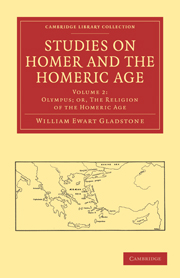Book contents
- Frontmatter
- Contents
- OLYMPUS: OR THE RELIGION OF THE HOMERIC AGE
- SECT. I On the mixed character of the Supernatural System, or Theo-mythology of Homer
- SECT. II The traditive element of the Homeric Theo-mythology
- SECT. III The inventive element of the Homeric Theo-mythology
- SECT. IV The Composition of the Olympian Court; and the classification of the whole supernatural order in Homer
- SECT. V The Olympian Community and its Members considered in themselves
- SECT. VI The Olympian Community and its Members considered in their influence on human society and conduct
- SECT. VII On the traces of an origin abroad for the Olympian Religion
- SECT. VIII The Morals of the Homeric Age
- SECT. IX Woman in the heroic age
SECT. VI - The Olympian Community and its Members considered in their influence on human society and conduct
Published online by Cambridge University Press: 05 October 2010
- Frontmatter
- Contents
- OLYMPUS: OR THE RELIGION OF THE HOMERIC AGE
- SECT. I On the mixed character of the Supernatural System, or Theo-mythology of Homer
- SECT. II The traditive element of the Homeric Theo-mythology
- SECT. III The inventive element of the Homeric Theo-mythology
- SECT. IV The Composition of the Olympian Court; and the classification of the whole supernatural order in Homer
- SECT. V The Olympian Community and its Members considered in themselves
- SECT. VI The Olympian Community and its Members considered in their influence on human society and conduct
- SECT. VII On the traces of an origin abroad for the Olympian Religion
- SECT. VIII The Morals of the Homeric Age
- SECT. IX Woman in the heroic age
Summary
We have thus far considered the deities of Homer as they are, or are represented by him to be, in themselves individually, and in their mutual relations. We have now to consider the relation which subsisted between them and the race of man, especially on its human side; the state of religious sentiment and obligation, and of the moral law, both as towards heaven and likewise as between man and man, so far as it is immediately associated with the system of which they are the representatives. Another large part of morals, which was already in great part detached from visible relation to religion, will remain for separate consideration.
And here we may remark, that the Homeric Greeks apparently knew nothing of any periodical religious observance of commanding authority, such as to form a centre either for national union, or for the life of the individual. Had there been such an observance, we must, without doubt, have found a trace of it on the Shield of Achilles. The only festival, of which we have clear information, is that of Apollo in the Odyssey, on the first day of the month. More obscurely, one of Minerva appears to be indicated in II. ii. 551. No religious worship, properly to be so called, accompanied the funeral of Patroclus, or the games which followed it. The Winds were called in aid for a special purpose. The invocation of Sperclieus is an apology for devoting to Patroclus the hair which Peleus had, on his son's behalf, vowed to that River-god.
- Type
- Chapter
- Information
- Studies on Homer and the Homeric Age , pp. 367 - 396Publisher: Cambridge University PressPrint publication year: 2010First published in: 1858



